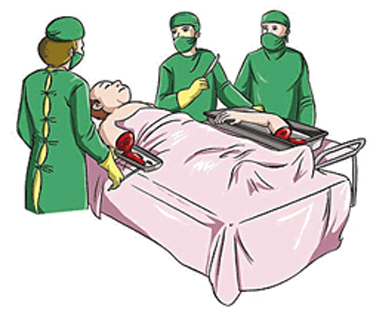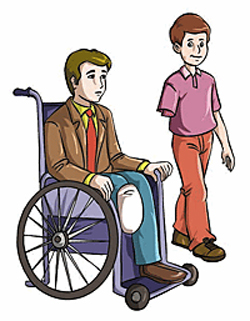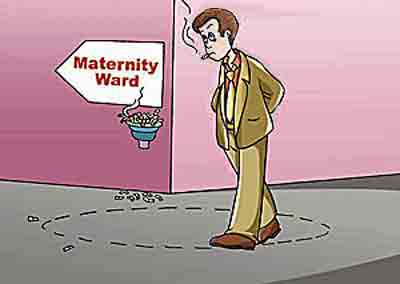ambi-, amb-, ambo-
(Latin: both, on both sides; around, about; vague; obscure)
A personality pattern that has characteristics of both introversion and extroversion: Esther was really liked among her fellow students because of her ambiversion or her balanced personality and temperament.
An individual whose personality characteristics include both extrovert and introvert qualities: An ambivert is halfway between being sociable and an outgoing person or someone who tends to concentrate on his or her own thoughts and feelings instead of communicating with other people.
ambivorous (adjective), more ambivorous, most ambivorous
Referring to creatures which feed on broad-leaved vegetation and grasses: In the zoology book that Doug was reading, he found out that ambivorous animals; such as, cattle, horses, camels, zebras, and giraffes all eat plants with flat leaves, but not those which are like pine needles.
A person who is skillful with both hands: the literal meaning is "both right" or having "two right" hands: Joe, who was the best ambodexter in his team, played magnificently in the basketball competition because he was very talented with handling the ball with either of his hands.
ambosexual (adjective), more ambosexual, most ambosexual
Suitable or designed for both males and females: Jack and Jill went to the clothing store and found some very nice ambosexual garments that both of them could wear.
amputate (verb), amputates; amputated; amputating
1. To cut off a projecting body part, a limb, or other appendage of the body; especially, in a surgical operation: Robert’s little finger had to be amputated because he hurt it severely while chopping some wood with an axe.
2. Etymology: from the Mid-16th century Latin amputat-, past participle of amputare, "cut around" from ambi-, "around" plus putare "to cut".
2. Etymology: from the Mid-16th century Latin amputat-, past participle of amputare, "cut around" from ambi-, "around" plus putare "to cut".
1. The surgical removal of all or sections of an arm, a leg, an organ, or another part of the body: While cutting the hedge with an electric trimmer, Margarete had a terrible accident and an amputation of her hand had to be performed by a surgeon.
2. Traumatic or spontaneous loss of a limb, organ, or part: The most common indication for an amputation of an upper jointed appendage is severe trauma and it may be the result of a cancerous growth, infection, or gangrene.

2. Traumatic or spontaneous loss of a limb, organ, or part: The most common indication for an amputation of an upper jointed appendage is severe trauma and it may be the result of a cancerous growth, infection, or gangrene.

A person who removes or cuts off a part of or all of the limb of the body: An amputator is a physician who has specialized in surgery: Joseph Lister was a famous English amputator who used antiseptics for the first time when operating on patients.
Someone who has had an appendage of the body cut off: After having his leg below the knee amputated because of gangrene, Ralph, the amputee, received an artificial replacement that allowed him to be quite mobile after rehabilitation.


ancillary (adjective), more ancillary, most ancillary
1. Descriptive of being connected with something, but being less important than the main thing or other people: Grace has an ancillary remuneration, in addition to her retirement earnings, for working in the garden of the building where she is living.
2. Referring to an individual who supports professional people; such as, doctors and teachers to help them in their work: Jack, the teacher’s aid, was considered to be an ancillary assistant because he gave Mrs. Smart a helping hand in so many ways.
3. Relating to something that is of secondary importance: Mildred took a great deal of pride in her work, even though the pay was poor and most of her duties were ancillary activities compared to those of the man she was working with.
4. Etymology: from Latin ancillaris, "relating to maidservants"; from ancilla, "handmaid"; derived from anculus, "servant"; literally, "he who bustles about"; from the root of ambi-, "around" + -culus, "attend to, cultivate".

© ALL rights are reserved.
Go to this Word A Day Revisited Index
2. Referring to an individual who supports professional people; such as, doctors and teachers to help them in their work: Jack, the teacher’s aid, was considered to be an ancillary assistant because he gave Mrs. Smart a helping hand in so many ways.
3. Relating to something that is of secondary importance: Mildred took a great deal of pride in her work, even though the pay was poor and most of her duties were ancillary activities compared to those of the man she was working with.
4. Etymology: from Latin ancillaris, "relating to maidservants"; from ancilla, "handmaid"; derived from anculus, "servant"; literally, "he who bustles about"; from the root of ambi-, "around" + -culus, "attend to, cultivate".

Go to this Word A Day Revisited Index
so you can see more of Mickey Bach's cartoons.
Being encompassed or enclosed on all sides; surrounded: Recently, the employees of Karl's company have been living in a circumambience of economic gloom.
A situation in which someone is being enveloped or encircled by something: The circumambiency of gloom and sadness was unmistakable when the small group of relatives heard about the death of their beloved father.
circumambient (adjective), more circumambient, most circumambient
1. A reference to something which is surrounded completely by something else: The little island was in the middle of the circumambient lake and could only be reached by boat!
2. Relating to an area or border around a specific thing or place: The circumambient mountains enclosed the small valley below which discouraged tourists from going there.
3. Etymology: from Latin circum, "around, round about, on all sides" + ambire, "to go around, to surround"; from amb-, "on both sides, around" + ire, "to go".
2. Relating to an area or border around a specific thing or place: The circumambient mountains enclosed the small valley below which discouraged tourists from going there.
3. Etymology: from Latin circum, "around, round about, on all sides" + ambire, "to go around, to surround"; from amb-, "on both sides, around" + ire, "to go".
circumambiently (adverb), more circumambiently, most circumambiently
Pertaining to how something is done in an enclosing manner: The high hedge was planted circumambiently around the villa by the gardener a few years ago so it would completely hide the family's home.
circumambulate (sur" kuhm AM byuh layt) (verb), circumambulate; circumambulated; circumambulating
1. To walk around something continuously: James was so nervous before his oral test that he couldn’t sit still, so he circumambulated countless times before he was called in by the professor.
2. To avoid the point of a subject or discussion: Timothy noticed that Jack was circumambulating the main aspect of the topic, which needed to be decided on, and asking questions which were not relevant to the important issue at hand.

2. To avoid the point of a subject or discussion: Timothy noticed that Jack was circumambulating the main aspect of the topic, which needed to be decided on, and asking questions which were not relevant to the important issue at hand.

Jerome was nervously circumambulating at the hospital as he was waiting to hear from his wife about the birth of their child.


